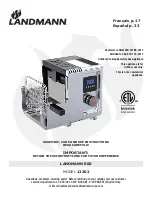
15
Grill Lighting Instructions:
1. BEFORE LIGHTING:
Always i
nspect the gas supply hose before turning the gas “ON”. If there is evidence of cuts, wear, or
abrasion, it must be replaced before use. Use only a manufacturer approved replacement hose.
Check all gas connections for leaks before each use. Do not light grill if gas odor is present.
2. TO LIGHT MAIN BURNERS OF THE GRILL: (see Fig. 10)
Read instructions before lighting (see labels on top edge of the pull out grease tray)
Open lid prior to lighting your grill.
Turn all knobs to
“OFF” then open the propane cylinder valve, OR natural gas valve on your gas connection.
NOTE: Always keep your face and body averted when lighting.
Push in and rotate each control knob counter clockwise slowly, to the high position
. (When rotating the
knob, rotate for a two second count: do NOT turn the knob rapidly) The built-in igniter
will click and spark,
thus lighting the torch light pilot flame, then the main burner. If the burner does not light IMMEDIATELY turn
the knob to off and wait 5 minutes for gas to dispel and repeat the lighting procedure.
Follow match lighting instructions if burner can
’t be lit after repeating 3-4 times.
3. TO LIGHT MAIN BURNERS USING A MATCH OR BARBECUE LIGHTER:
(Temporary Solution when Ignition is disabled)
Read instructions before lighting.
Open the lid during lighting, and remove cook grids.
Turn all knobs to
“OFF” then open the propane cylinder valve, OR natural gas valve on your gas connection.
NOTE: Always keep your face and body averted when lighting.
A long stove match or BBQ lighter must be used to reach the burners.
Do NOT drop a burning match into grill for lighting purposes; hold the match in the desired spot.
Push and turn the main burner knob to the high position
, then release.
Light burner by match at the front end of the burner tube. Make sure the burner lights and stays lit.
If necessary, call your dealer or the Jackson help line, for assistance with repairing your ignition system.
4. FLAME CHARACTERISTICS: (Fig. 11)
Check for proper burner flame characteristics. Each burner is adjusted prior to shipment; however, variations
in the local gas supply may mean subtle adjustments may be necessary.
Burner flames should be blue and stable. There should be no excessive noise, or flame lifting. If any of these
conditions exist please call your Dealer. If the flame is yellow, it indicates insufficient air. If the flame is noisy
and tends to lift away from the burner, it indicates too much air.
NOTE: small yellow tips are okay.
OFF setting
HI setting
& Ignition
LOW setting
Figure 12










































